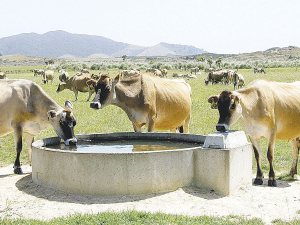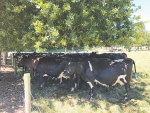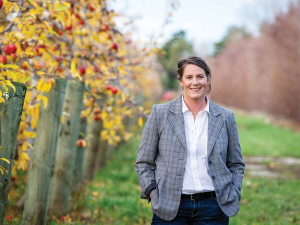As temperatures soar, farmers are being urged to review feed plans and consider what supplements could help reduce the impact of heat stress on their cows.
Heat stress not only impacts a cow's milk production, but the resulting loss of body condition can have a detrimental and longer-term flow on effect.
"If cows lose body condition now, it can potentially affect them throughout the remainder of the season as they play catch-up before calving and into the next season's mating," says GrainCorp technical support manager, Glen McFarlane. "In-calf cows under stress and under fed at this time of year can reabsorb the foetus. Body condition loss now will come at a cost later when you need to put it back on."
Dairy cows are generally comfortable between four and 20 degrees Celsius. But as soon as the temperature rises, cows use a lot more energy, generating heat as they digest their feed, which makes them run hotter.
McFarlane says there are some simple things farmers can do to combat heat stress and maintain cows' energy levels.
"I'd suggest reviewing your feed plan so you're using more feed in the cooler part of the day and feeding concentrates as it gets hotter in the afternoon.
"Using supplements like molasses, salt and Levucell SC can also improve dry matter intake and fibre digestion. They are ideal for complementing a good nutrition programme and maintaining good production over the summer months.
"Molasses provides energy, while salt helps cows regulate their temperature. Products like Levucell SC make fibre digestion easier, reducing the amount of heat produced by the cow.
"Reviewing your cows' diet to ensure they're not eating too much feed that is high in neutral detergent fibre (NDF) is important as these feeds take a lot more energy to break down."
He also encourages farmers to spend time looking at their cows' breathing to assess if heat stress is an issue.
"A good visual assessment for heat stress is to take note of how many breaths they take in 10 seconds. Around seven breaths is good, but if it's closer to 10, the cow is likely suffering from heat stress."
Cows suffering from heat stress may also stand around rather than grazing or may be slow in walking to the milking shed. McFarlane says these indicators are often seen before heat stress impacts milk production levels.
Along with reviewing feed plans and supplements, McFarlane reminds farmers to keep doing the basics well.
"Make sure there is plenty of shade for animals, including at the milking shed, and using sprinklers together with fans in the shed.
"You could also consider shifting milking times to avoid cows standing in the shed during the hottest parts of the day."
He encourages farmers to contact their feed company if they have questions about managing heat stress and what supplements could help maintain cows' body condition and minimise production loss.










